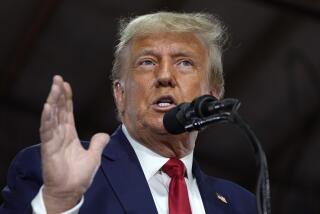Judge Tells North He Can’t Hide in ‘President’s Cloak’
- Share via
WASHINGTON — A federal judge sternly warned retired Marine Lt. Col. Oliver L. North on Monday that he could not wrap himself “in the President’s cloak” to defend himself against conspiracy charges in the Iran-Contra arms scandal.
U.S. District Judge Gerhard A. Gesell made his remarks from the bench after North’s lawyers contended that congressional prohibitions on furnishing military aid to Nicaragua’s rebels were not directed at presidential advisory agencies such as the National Security Council, for which North formerly worked. Rather, they were intended to restrain the CIA and other intelligence bodies, the attorneys said.
“This is a prosecution of an employee of the executive branch who worked at the White House,” Gesell said, declaring that North’s trial--the first of four separate trials for defendants in the case--probably would begin in late January.
Can’t Speak for President
“Neither North nor North’s counsel can ever purport to speak for the President of the United States,” the judge continued, as North sat alongside his lawyers. “Neither can they wrap themselves in the President’s cloak to justify North’s conduct.”
Gesell, at the same time, rejected contentions by the Justice Department that the prosecution of North for conspiracy by independent counsel Lawrence E. Walsh “potentially criminalizes” disputes between executive branch officials and Congress.
The department, in a friend-of-the-court brief that sided with North, had argued that the theory used by Walsh to prosecute North “threatens the system” of separation of powers in view of the fact that North, as an executive branch employee, was acting contrary to the will of Congress.
‘Academic Dispute’
But Gesell called this “an academic dispute . . . over the separation-of-powers doctrine,” adding that “the court is not concerned with theory . . . rather, the reality of trial.”
He said that President Reagan has the prerogative to protect any secrets he believes may be compromised by a trial. But he noted that “the President has made no effort to prevent this case from going forward.”
In what seemed to be a suggestion that Reagan could pardon North or prevent his prosecution by withholding key documents needed for the trial, Gesell said:
“The court has a very limited role. It will continue to strive for a fair trial. But under the Constitution it is for the President, not North or any witness, to protect the prerogatives of the President’s office if he deems them unduly threatened.”
Administration officials have attempted to make the case that some documents and evidence in the trial could pose security threats. “We are fully aware” of potential security risks, a senior Administration official said Monday.
And Reagan, who flew to his California ranch Monday for Thanksgiving, reiterated that he does not plan to pardon North. “No, no,” he said. “And I don’t think it would be any time to make such a decision while it’s still before the courts.”
Gesell said he was “puzzled” by the arguments of North’s attorneys that the diversion of Iranian arms-sale profits to the Nicaraguan rebels did not violate the congressional ban on military aid to the Contras authored by Rep. Edward P. Boland (D-Mass.).
“The indictment clearly depends upon the application of the Boland Amendment to the National Security Council,” said defense attorney John D. Cline, arguing that it did not apply.
Actual Operations
The amendment was intended to apply only to intelligence agencies that carry out actual operations and are funded under the Defense Authorization Act, he told the court, noting that the NSC is not funded under this act and functions only to help the President plan foreign policy.
Disagreeing with Cline, deputy independent counsel Gerard E. Lynch asserted that the NSC at North’s direction had been involved in specific covert operations to help the Contras “without (presidential) authorization” and without notification of Congress as required by law.
Gesell, in an exasperated tone, told Cline:
“I am having a difficult time understanding why it is necessary to decide what the Boland Amendment means. . . . Are you saying the President of the United States affirmatively intended to skim off the profits of the enterprise and use them to buy arms in Nicaragua?”
Cline said that was not his contention. Gesell then told him that his argument “seems like Jell-O. It doesn’t have anything I can pick up with my hands.”
Staff writer Lee May in Santa Barbara contributed to this story.
More to Read
Sign up for Essential California
The most important California stories and recommendations in your inbox every morning.
You may occasionally receive promotional content from the Los Angeles Times.













